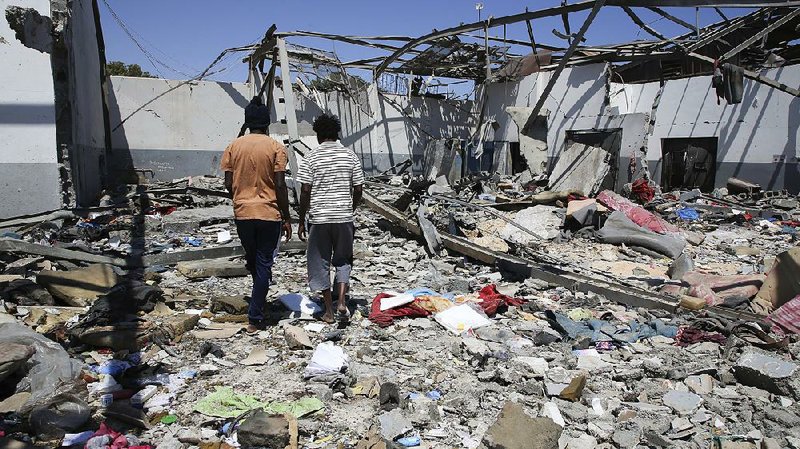CAIRO -- A boat from Libya carrying 86 migrants sank in the Mediterranean and left only three survivors, authorities said Thursday, after an airstrike on a detention center near the Libyan capital killed dozens of others.
The twin tragedies illustrate the choice facing those who have reached the North Africa coast while seeking a better life in Europe: Risk a hazardous sea voyage in a flimsy, rubber-sided boat, or face being crammed into a detention center, where some of the migrants say they have been forced to assemble weapons for someone else's war.
"I fled from the war, to come to this hell of Libya," said one teenager from sub-Saharan Africa who suffered minor injuries in Tuesday night's airstrike near Tripoli. "My days are dark here."
The International Organization for Migration said the boat sank late Wednesday off the Tunisian city of Zarzis and 82 of the migrants who had been on board were missing. Fishermen pulled four men from the water, and one died overnight, said Lorena Lando, the agency's head in Tunisia, said.
The boat, which had sailed from the Libyan port of Zuwara, was carrying twice as many people as should have been aboard, said Chamseddine Merzoug, a Tunisian Red Crescent volunteer in an interview on Skype.
The United Nations and aid groups blame the deaths in part on the European Union's policy of partnering with militias in war-torn Libya to prevent migrants from trying to cross the sea, saying the policy leaves migrants at the mercy of brutal traffickers or confined in detention facilities near front lines, often without adequate food and water.
Migrants who survived the airstrike said they were conscripted by a militia to work in a weapons workshop at the Tajoura detention center, which had been the focus of a U.N. warning in May after an earlier airstrike hit 100 yards away.
The wounded teenager said he fled war in his homeland at the age of 14, seeking to join fellow citizens who made it to Europe in rickety boats. But his journey was riddled with torture and abuse. By the time he reached the coast, Europe was no longer so welcoming and he was caught by the EU-funded Libyan coast guard and spent 20 months in the detention center.
For the past eight months there, he labored without pay in the workshop adjacent to a hangar housing dozens of migrants, cleaning the militia's weapons, from rifles to anti-aircraft guns, said the boy, who refused to give his name or nationality for fear of reprisal from the militias. When the U.N. or other aid agencies visited, migrants said, the militia hid the weapons.
The decision to store weapons at the facility in Tajoura, east of Tripoli, may have made it a target for the self-styled Libyan National Army, which is at war with an array of militias allied with a weak, U.N.-recognized government in the capital.
The Tripoli government has blamed the Libyan National Army and its foreign backers for the airstrike, which killed at least 44 and wounded more than 130. The group, led by Field Marshal Khalifa Hifter, says it targeted a nearby militia position and denies striking the hangar where the migrants were being held. U.N. human-rights chief Michelle Bachelet said the attack might amount to a war crime.
Hifter, whose forces control much of eastern and southern Libya, has received support from Egypt, France, the United Arab Emirates, Saudi Arabia and Russia.
Nearly at the same time as the bombs hit near Tripoli, a man speaking English made a call for help from off the coast of the Libyan city of Zawiya. He was with at least 60 people, a third of them women and children, and their boat was taking on water quickly, according to the call log from Alarm Phone, an aid group that takes emergency phone calls from the Mediterranean.
He said the passengers are afraid of dying, and the boat is sinking quickly, but he could see the lights of the town still twinkling in the distance. The responder said their best hope was the Libyan coast guard but he needed to give a GPS location.
"I only have a little phone," he replied.
The coast guard never went out that night.
On Thursday, the U.N. migration agency confirmed a boat sank off the Tunisian coast, maybe 60 miles away, with 86 people on board.
It was not immediately clear if that the boat was the source of the phone call.
Also Thursday, the Italian humanitarian group Mediterranea Saving Humans said one of its sailboats rescued 54 migrants about 65 nautical miles north of Libya.
The rescue went ahead even though Italian authorities told the group to stand down and let the Libyan coast guard handle it, said Beppe Caccia, onshore coordinator for group.
Information for this article was contributed by Jamey Keaten, Renata Brito and Bouazza Ben Bouazza of The Associated Press.
A Section on 07/05/2019
